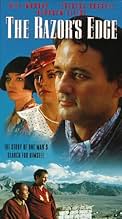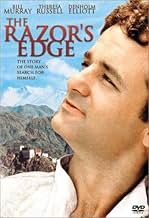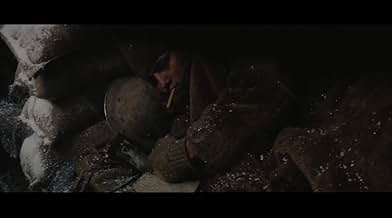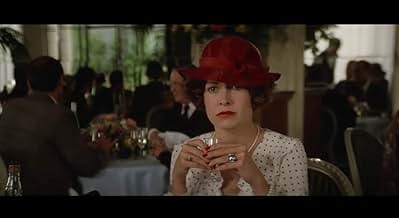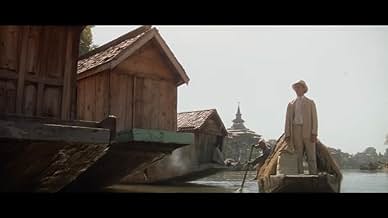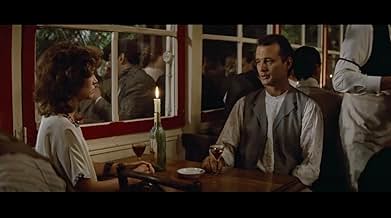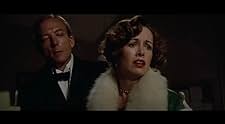CALIFICACIÓN DE IMDb
6.4/10
6.2 k
TU CALIFICACIÓN
Lo tenía todo y no quería nada. Aprendió que no tenía nada y lo quería todo.Lo tenía todo y no quería nada. Aprendió que no tenía nada y lo quería todo.Lo tenía todo y no quería nada. Aprendió que no tenía nada y lo quería todo.
- Dirección
- Guionistas
- Elenco
André Maranne
- Joseph, the Butler
- (as Andre Maranne)
Robert Manuel
- Albert
- (as Roberet Manuel)
- Dirección
- Guionistas
- Todo el elenco y el equipo
- Producción, taquilla y más en IMDbPro
Opiniones destacadas
It is a bit surprising that Hollywood ever made a film out of Somerset Maugham's novel "The Razor's Edge". This is because the story has a lot of existential elements and is far from the typical fare coming from the studios. Despite this, they made a 1946 version with Tyrone Power and a 1984 version with Bill Murray. Of the two, I prefer the 1946 version--some of which because it generally sticks closer to the novel. However, being 1946, the sexual elements were sanitized a bit....though it still is superior for several reasons...most notably Bill Murray's odd performance.
The story begins just before the US entered WWI. Some friends are gathered for a party before several of them head to Europe as volunteer ambulance drivers. Not surprisingly, this experience transformed Larry (Murray) and instead of coming home after the war, he stays in France. At first, his girlfriend (Catherine Hicks) supports this bohemian lifestyle for him, but after it's clear he's never returning home to his old patrician life, she marries another man. During the rest of the film, Larry works many low-paying jobs...enough to survive and enough to travel. He's on a journey to explore himself and life and eventually it takes him to India and the East.
At the same time, the film focuses on the folks Larry left behind back in Illinois. While they are all rich, they aren't necessarily happy. Some are a bit screwed up, others are totally out of control. The parallel between these shallow, stagnant rich folks and the poor but happy Larry is the gist of the film.
Bill Murray can be a very funny man and has made some wonderful films. That being said, he's all wrong for the film for two main reasons. Sometimes (particularly earlier in the movie) he seems a lot like Bill Murray, not the character in the novel. He is a bit of a smart aleck and his reactions seem like Murray in "Meatballs" or "Ghostbusters". However, a bit later, he often is 100% deadpan...much like he later did in "Broken Flowers" and "Lost in Translation". But then, oddly, some of the earlier personality and sarcasm still occasionally pokes through...which is not consistent with the story or character. As a result, it definitely blunts the impact of the story...a very important story since it focuses on the meaning of life and is supposed to be a story with great depth.
Another problem, though much less important, is that sometimes the film didn't try very hard to capture the era in which it was supposed to be set. In particular, the lovely Catherine Hicks looks great...and much like a woman who is living during 1984. Her hairstyle is wrong for 1916-1920. Fortunately, when the film got to 1929, her hair was period appropriate.
Overall, an interesting experiment that ultimately fell a bit flat. I appreciate the risk Murray took but ultimately it's a story that just doesn't quite hit the mark. This apparently was the prevailing attitude back in 1984 and the movie lost a lot of money....earning back less than half of its costs.
By the way, I wouldn't mind seeing a third version of this story. The basic story idea by Maugham is laudable...man's search for meaning. But the first film was a bit too tame and the second was just a bit of a mess. I'd love to see one that would correct this as well as sticking very close to the source material.
The story begins just before the US entered WWI. Some friends are gathered for a party before several of them head to Europe as volunteer ambulance drivers. Not surprisingly, this experience transformed Larry (Murray) and instead of coming home after the war, he stays in France. At first, his girlfriend (Catherine Hicks) supports this bohemian lifestyle for him, but after it's clear he's never returning home to his old patrician life, she marries another man. During the rest of the film, Larry works many low-paying jobs...enough to survive and enough to travel. He's on a journey to explore himself and life and eventually it takes him to India and the East.
At the same time, the film focuses on the folks Larry left behind back in Illinois. While they are all rich, they aren't necessarily happy. Some are a bit screwed up, others are totally out of control. The parallel between these shallow, stagnant rich folks and the poor but happy Larry is the gist of the film.
Bill Murray can be a very funny man and has made some wonderful films. That being said, he's all wrong for the film for two main reasons. Sometimes (particularly earlier in the movie) he seems a lot like Bill Murray, not the character in the novel. He is a bit of a smart aleck and his reactions seem like Murray in "Meatballs" or "Ghostbusters". However, a bit later, he often is 100% deadpan...much like he later did in "Broken Flowers" and "Lost in Translation". But then, oddly, some of the earlier personality and sarcasm still occasionally pokes through...which is not consistent with the story or character. As a result, it definitely blunts the impact of the story...a very important story since it focuses on the meaning of life and is supposed to be a story with great depth.
Another problem, though much less important, is that sometimes the film didn't try very hard to capture the era in which it was supposed to be set. In particular, the lovely Catherine Hicks looks great...and much like a woman who is living during 1984. Her hairstyle is wrong for 1916-1920. Fortunately, when the film got to 1929, her hair was period appropriate.
Overall, an interesting experiment that ultimately fell a bit flat. I appreciate the risk Murray took but ultimately it's a story that just doesn't quite hit the mark. This apparently was the prevailing attitude back in 1984 and the movie lost a lot of money....earning back less than half of its costs.
By the way, I wouldn't mind seeing a third version of this story. The basic story idea by Maugham is laudable...man's search for meaning. But the first film was a bit too tame and the second was just a bit of a mess. I'd love to see one that would correct this as well as sticking very close to the source material.
I saw this movie when it was released in 1984. Being a big Bill Murray fan drew me to it and the story did the rest. It was my first year in college and I dreamed of running away with nothing but some books and a canvas bag. I dreamed vicariously through this movie for awhile. Who hasn't wanted to travel the world anonymously? It is the essence of life, the secret to life, that is held in the dream that Mr. Murray must have had at some point in his lifetime that drove him to make this movie.
For all you naysayers out there: Movies don't have to be perfect. Some can be appreciated for the trash quality (Wild Things), some for crassness (Something About Mary), and others for a single scene (Saving Private Ryan). This movie is for dreamers who don't give a fck what everyone else is doing.
For all you naysayers out there: Movies don't have to be perfect. Some can be appreciated for the trash quality (Wild Things), some for crassness (Something About Mary), and others for a single scene (Saving Private Ryan). This movie is for dreamers who don't give a fck what everyone else is doing.
This is one of those films that defines the difference between a "film" and a "movie". Maugham, in print form, often drags; Murray's senses of humor and timing eschew that hurdle and make a beautiful story of growth and epiphany accessible in just two short hours.
The "test" aspect for me here is simple and a bit autocratic, if not downright arrogant as Hell; I don't want to know well anyone who does not appreciate this film.
The "test" aspect for me here is simple and a bit autocratic, if not downright arrogant as Hell; I don't want to know well anyone who does not appreciate this film.
"The Razor's Edge" is based on a novel of the same title.
"The Razor's Edge" takes place over at least a decade, moving from the midwestern U.S to WWI in Europe to Paris and what might be Tibet and back to Paris again. It's a nice film to look at, as the period and place production really sucks one into the story, and has what I thought of as a cozy pacing, but what some might think drags on a little (it was a great, alone-on-a-rainy-Sunday, laying-on-the-couch rental for me).
The film does a good job of playing ideas with scenes, and playing the ideas/scenes off of seemingly drastically different ones, from the barren emptiness of a battlefield to the uplifting emptiness of the Himalayas, to the warm loneliness of a Paris café, to the cold loneliness of a rich man's death bed.
This is obviously a true labor of love for Bill Murray. He nails his character and the ideas the script attempts to channel through his character's development. Hopefully, now that somehow people can "accept" Bill Murray as not "just" an overtly comedic actor (with the success of "Lost in Translation") people will be more open to enjoying this very good film.
"The Razor's Edge" takes place over at least a decade, moving from the midwestern U.S to WWI in Europe to Paris and what might be Tibet and back to Paris again. It's a nice film to look at, as the period and place production really sucks one into the story, and has what I thought of as a cozy pacing, but what some might think drags on a little (it was a great, alone-on-a-rainy-Sunday, laying-on-the-couch rental for me).
The film does a good job of playing ideas with scenes, and playing the ideas/scenes off of seemingly drastically different ones, from the barren emptiness of a battlefield to the uplifting emptiness of the Himalayas, to the warm loneliness of a Paris café, to the cold loneliness of a rich man's death bed.
This is obviously a true labor of love for Bill Murray. He nails his character and the ideas the script attempts to channel through his character's development. Hopefully, now that somehow people can "accept" Bill Murray as not "just" an overtly comedic actor (with the success of "Lost in Translation") people will be more open to enjoying this very good film.
Elegant but facile version of the Maugham novel, a passion project for Murray who is good in parts of the film but flat in others. On it's own an okay film hampered by over-length but compared to the Tyrone Power/Gene Tierney original, which has its own problems, it's a pale shadow. A good deal of the fault for that lies in both the direction and the performances. The general ennui of the performances may in fact be laid at the director's feet. All are capable actors as they've shown elsewhere but here be it a mismatch of actor/actress and part or lack of direction most founder.
Theresa Russell does the film's best work but even her Sophie is missing the bruised sorrow that made Anne Baxter's take on the part so compelling and won her the Oscar for best supporting actress. James Keach evaporates from the screen in a rather thankless role that John Payne managed to make an impression in with a show of quiet strength. Surprisingly the weakest of the star spots is Catherine Hicks, usually a very fine actress, adrift in her part. She exudes a warm presence on screen totally wrong for the heartless, mindlessly cruel Isabel that Gene Tierney playing with an icy edge made vivid.
A good try but only average.
Theresa Russell does the film's best work but even her Sophie is missing the bruised sorrow that made Anne Baxter's take on the part so compelling and won her the Oscar for best supporting actress. James Keach evaporates from the screen in a rather thankless role that John Payne managed to make an impression in with a show of quiet strength. Surprisingly the weakest of the star spots is Catherine Hicks, usually a very fine actress, adrift in her part. She exudes a warm presence on screen totally wrong for the heartless, mindlessly cruel Isabel that Gene Tierney playing with an icy edge made vivid.
A good try but only average.
¿Sabías que…?
- TriviaBill Murray made a deal with Columbia Pictures that he would appear in Los cazafantasmas (1984) only if they financed this movie. Originally, no studio was interested in making the film until Dan Aykroyd suggested the deal to Murray. On the final day of shooting, Murray flew to New York City to start filming Ghostbusters.
- Citas
Tibetan Monk: The pathway to salvation is as narrow and as difficult to walk as a razor's edge.
- ConexionesFeatured in At the Movies: Choose Me/The Razor's Edge/Full Moon in Paris (1984)
Selecciones populares
Inicia sesión para calificar y agrega a la lista de videos para obtener recomendaciones personalizadas
- How long is The Razor's Edge?Con tecnología de Alexa
Detalles
- Fecha de lanzamiento
- Países de origen
- Sitio oficial
- Idioma
- También se conoce como
- The Razor's Edge
- Locaciones de filmación
- Productoras
- Ver más créditos de la compañía en IMDbPro
Taquilla
- Presupuesto
- USD 13,000,000 (estimado)
- Total en EE. UU. y Canadá
- USD 6,551,987
- Fin de semana de estreno en EE. UU. y Canadá
- USD 2,411,311
- 21 oct 1984
- Total a nivel mundial
- USD 6,551,987
- Tiempo de ejecución2 horas 8 minutos
- Color
- Relación de aspecto
- 2.35 : 1
Contribuir a esta página
Sugiere una edición o agrega el contenido que falta

Principales brechas de datos
What is the French language plot outline for El filo de la navaja (1984)?
Responda

